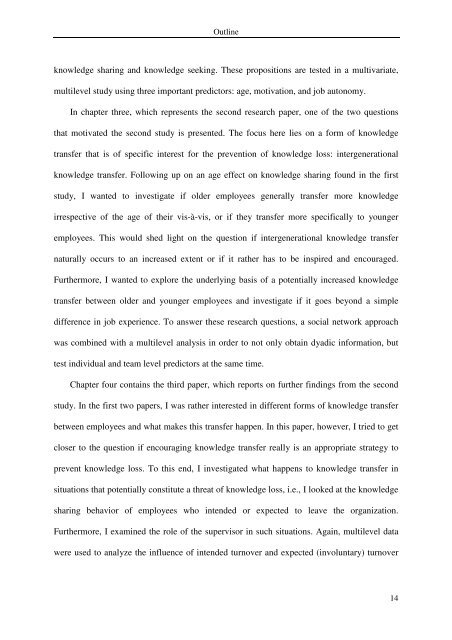thesis_Daniela Noethen_print final - Jacobs University
thesis_Daniela Noethen_print final - Jacobs University
thesis_Daniela Noethen_print final - Jacobs University
Create successful ePaper yourself
Turn your PDF publications into a flip-book with our unique Google optimized e-Paper software.
Outline<br />
knowledge sharing and knowledge seeking. These propositions are tested in a multivariate,<br />
multilevel study using three important predictors: age, motivation, and job autonomy.<br />
In chapter three, which represents the second research paper, one of the two questions<br />
that motivated the second study is presented. The focus here lies on a form of knowledge<br />
transfer that is of specific interest for the prevention of knowledge loss: intergenerational<br />
knowledge transfer. Following up on an age effect on knowledge sharing found in the first<br />
study, I wanted to investigate if older employees generally transfer more knowledge<br />
irrespective of the age of their vis-à-vis, or if they transfer more specifically to younger<br />
employees. This would shed light on the question if intergenerational knowledge transfer<br />
naturally occurs to an increased extent or if it rather has to be inspired and encouraged.<br />
Furthermore, I wanted to explore the underlying basis of a potentially increased knowledge<br />
transfer between older and younger employees and investigate if it goes beyond a simple<br />
difference in job experience. To answer these research questions, a social network approach<br />
was combined with a multilevel analysis in order to not only obtain dyadic information, but<br />
test individual and team level predictors at the same time.<br />
Chapter four contains the third paper, which reports on further findings from the second<br />
study. In the first two papers, I was rather interested in different forms of knowledge transfer<br />
between employees and what makes this transfer happen. In this paper, however, I tried to get<br />
closer to the question if encouraging knowledge transfer really is an appropriate strategy to<br />
prevent knowledge loss. To this end, I investigated what happens to knowledge transfer in<br />
situations that potentially constitute a threat of knowledge loss, i.e., I looked at the knowledge<br />
sharing behavior of employees who intended or expected to leave the organization.<br />
Furthermore, I examined the role of the supervisor in such situations. Again, multilevel data<br />
were used to analyze the influence of intended turnover and expected (involuntary) turnover<br />
14

















